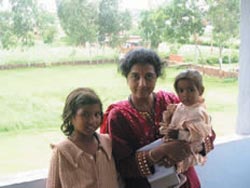Rupa’s story: child carers and mental illness in India
Chris Underhill
BasicNeeds is an organisation working in the field of mental health and development, founded by Chris Underhill. In close association with his colleague in India, D.M. Naidu, Chris has developed a mental health and development model, which is now being put into practice by colleagues and partners in India, Sri Lanka, Ghana, and soon Tanzania. In this short article Chris highlights the needs of children who care for their mentally ill parents, and considers the implications for their education.

Rupa Kumari is 12 and lives near Hazaribagh in Northern India. Her father used to be a cook at marriages, festivals and within prayer meetings (poojas). When he died suddenly, the family were plunged into destitution. Rupa’s mother, Ashtami Devi, is 28 years old and is mentally ill. She has one younger brother and one very young sister, Neelam. Rupa cares for this whole group of people calmly and with remarkable skill. The one support that Rupa has is her uncle Ramnath Pandey, her father’s brother. My colleague Shoba Raja, D.M. Naidu and I met Rupa Kumari and her family when we were visiting our partners, Nav Bharat Jagriti Kendra, a local non-governmental organisation, in Hazaribagh.
Child carers
The problem of child carers is very large in developing countries. It is quite possible that children may have to care for their ill relative for very many years. As BasicNeeds meets more mentally ill people through its consultation processes, the extent of the child carer problem is becoming increasingly obvious. As a result, we have decided to develop a policy in support of child carers, and would welcome input from any reader who has a point of view.
Rupa Kumari takes her younger sister, Neelam, to school with her. Her teacher has complained about this, but has let her stay in school with her sister, rather than miss out on education. Classes are big in rural areas in Northern India, so this was not an easy decision.
Our newly developing policy needs to take into account the needs of child carers to take advantage of any education facilities available, while at the same time recognising their adult responsibilities of family care.
School refusers
We have also observed that child carers tend to be either simply absent from school, or school refusers. Refusing to go to school can also be the first sign of an impending childhood mental illness. This particular problem is, of course, quite different from the one of children being carers. One situation, of course, can lead to the other in that carers of all ages can become frustrated and depressed at the apparent never-ending load.
For more information about BasicNeeds, please contact:
Su Hollington
BasicNeeds
158A Parade
Leamington Spa
Warwickshire
CV32 4AE
England
Tel: +44 (0)1926 330101
Fax: +44 (0)1926 453679
email: su.hollington@basicneeds.org.uk
www.basicneeds.org.uk
BasicNeeds would welcome your views on the development of a child carers’ policy.

